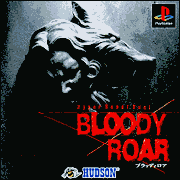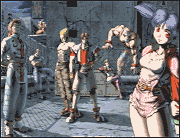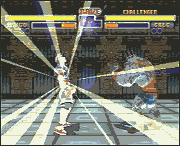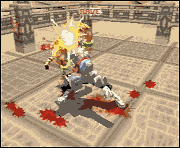![[GAMES & SOFTWARE]](/file/35716/EX CD Rom.iso/issue3_1/images/section_games_sw.gif)
 |

BLOODY ROAR
Copyright (C) 1997 Hudson Soft & Eighting / Raizing
Sony Playstation, 1-2 Player(s)
¥5800
— by Chris Kohler
|
 |

Ever since STREET FIGHTER II, it seems practically every software company has
put out a fighting game. Unfortunately, very few are worth anyone's time.
Gamers these days are faced with a new challenge—to weed through them all to
find a good title. Most are copycats, while others are just plain bad. At
first glance, I would have said that BLOODY ROAR falls under the copycat category.
But thanks to the innovative "beast" ability of each character, this title
couldn't be more original.
 BLOODY ROAR
(also known as BEASTORIZER) has graphics that remind me a
lot of TEKKEN 2, the most popular fighting title on the
PlayStation. The graphics engine is almost identical, which is a bonus for the
game. In fact, if it weren't for the Hudson Soft logo at the beginning, I would
have thought this was a Namco title. It even has the popular Namco-style
practice mode with directional arrows to show your moves at the bottom of the
screen. BLOODY ROAR also features the enclosed ring
element and many of the flashy special effects of the Sega Saturn game
FIGHTING VIPERS. BLOODY ROAR
(also known as BEASTORIZER) has graphics that remind me a
lot of TEKKEN 2, the most popular fighting title on the
PlayStation. The graphics engine is almost identical, which is a bonus for the
game. In fact, if it weren't for the Hudson Soft logo at the beginning, I would
have thought this was a Namco title. It even has the popular Namco-style
practice mode with directional arrows to show your moves at the bottom of the
screen. BLOODY ROAR also features the enclosed ring
element and many of the flashy special effects of the Sega Saturn game
FIGHTING VIPERS.
|
 |
|




 |
 |
 So what's different about BLOODY ROAR? It's the first game I've seen that
allows your character to change into an alternate form and back during the battle.
This adds a whole new level to the gameplay, unheard of before. So what's different about BLOODY ROAR? It's the first game I've seen that
allows your character to change into an alternate form and back during the battle.
This adds a whole new level to the gameplay, unheard of before.
 The premise of the game is based around eight characters who are all
lycanthropes (werewolves, etc.). Each one has the ability to change into a
half-human, half-animal version of himself, thus gaining incredible strength
and power. This transformation also gains back a small amount of precious life
for the character. As you would expect, each character's persona reflects
that of their animal side. For example, Alice is very fast, dexterous, and
cute—that's because she is part hare. The premise of the game is based around eight characters who are all
lycanthropes (werewolves, etc.). Each one has the ability to change into a
half-human, half-animal version of himself, thus gaining incredible strength
and power. This transformation also gains back a small amount of precious life
for the character. As you would expect, each character's persona reflects
that of their animal side. For example, Alice is very fast, dexterous, and
cute—that's because she is part hare.
 The control is quite good. (I won't go too deep into this area, because I
don't claim to be an expert player.) The game features most of the moves and
specials that you would come to expect in a fighting game: juggle combos, reversals,
throws; but the game does not have any projectile attacks. It compensates, instead,
with a variety of interesting throws. And characters gain unique moves when in
their animal form, adding to the diversity. Even the mere act of transforming
can be used as an attack. The control is quite good. (I won't go too deep into this area, because I
don't claim to be an expert player.) The game features most of the moves and
specials that you would come to expect in a fighting game: juggle combos, reversals,
throws; but the game does not have any projectile attacks. It compensates, instead,
with a variety of interesting throws. And characters gain unique moves when in
their animal form, adding to the diversity. Even the mere act of transforming
can be used as an attack.
 The music is average and the sounds are nice. The music features both an arcade
mix and a PlayStation mix. As for the voices, characters speak in their
native languages, and none of them got on my nerves, thankfully. In my opinion,
the best part about this game is its options. This game has all (and I do mean
all!) the options that you have ever seen in other fighting games and a ton more.
In fact, I can safely say I've never seen a game with so many extra features
and options. To list them all here would take too much space so I'll just go
over a few of my favorites. One of the play modes is called Watch, and it lets
you do just that. You can pick two characters and watch the computer do its
best to defeat itself. This is useful to learn new strategies and combos from the
computer without having to concentrate on playing at the same time. A special
Omake menu lists over 13 hidden options that can be unlocked by completing the
game using certain characters under a certain amount of time. And best of all,
anime fans in particular will get a kick out of the Art Gallery section. It
features over forty original pieces of art that were created both before and
after the game was finished. It includes both anime and manga style versions
of all the characters, and some who didn't make it into the game. The music is average and the sounds are nice. The music features both an arcade
mix and a PlayStation mix. As for the voices, characters speak in their
native languages, and none of them got on my nerves, thankfully. In my opinion,
the best part about this game is its options. This game has all (and I do mean
all!) the options that you have ever seen in other fighting games and a ton more.
In fact, I can safely say I've never seen a game with so many extra features
and options. To list them all here would take too much space so I'll just go
over a few of my favorites. One of the play modes is called Watch, and it lets
you do just that. You can pick two characters and watch the computer do its
best to defeat itself. This is useful to learn new strategies and combos from the
computer without having to concentrate on playing at the same time. A special
Omake menu lists over 13 hidden options that can be unlocked by completing the
game using certain characters under a certain amount of time. And best of all,
anime fans in particular will get a kick out of the Art Gallery section. It
features over forty original pieces of art that were created both before and
after the game was finished. It includes both anime and manga style versions
of all the characters, and some who didn't make it into the game.
 With decent control, nice visuals and more options than imaginable,
BLOODY ROAR gets a good grade in my book. If I can say one
thing about BLOODY ROAR, it's that you definitely get your
money's worth. With decent control, nice visuals and more options than imaginable,
BLOODY ROAR gets a good grade in my book. If I can say one
thing about BLOODY ROAR, it's that you definitely get your
money's worth.
Rating: *** (out of 4)
|
 |





